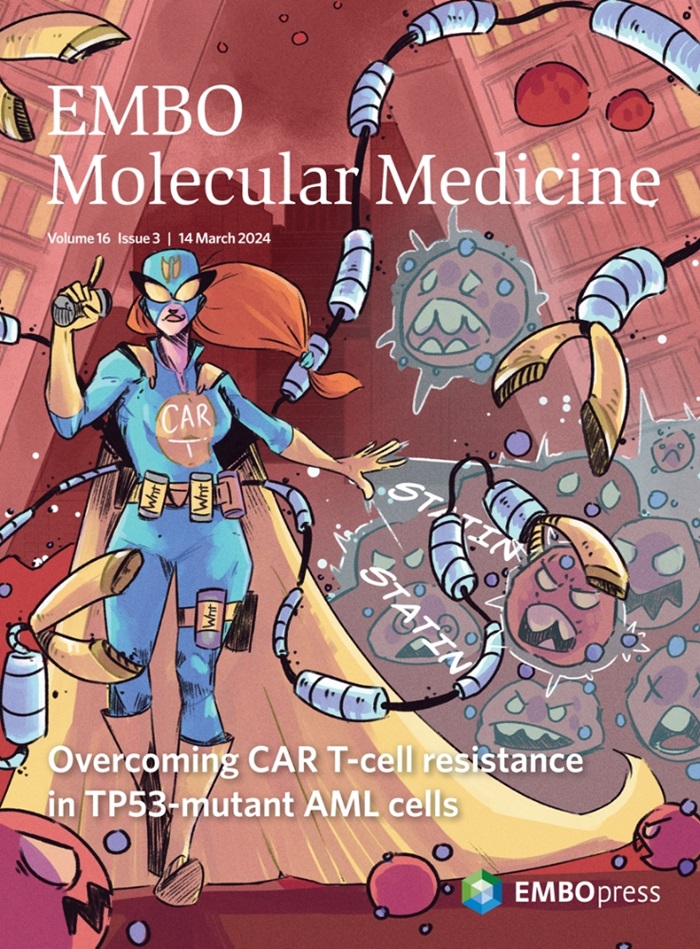De novo pyrimidine synthesis is a collateral metabolic vulnerability in NF2-deficient mesothelioma.
IF 9
1区 医学
Q1 MEDICINE, RESEARCH & EXPERIMENTAL
引用次数: 0
Abstract
Pleural mesothelioma (PM) is one of the deadliest cancers, with limited therapeutic options due to its therapeutically intractable genome, which is characterized by the functional inactivation of tumor suppressor genes (TSGs) and high tumor heterogeneity, including diverse metabolic adaptations. However, the molecular mechanisms underlying these metabolic alterations remain poorly understood, particularly how TSG inactivation rewires tumor metabolism to drive tumorigenesis and create metabolic dependencies. Through integrated multi-omics analysis, we identify for the first time that NF2 loss of function defines a distinct PM subtype characterized by enhanced de novo pyrimidine synthesis, which NF2-deficient PM cells are critically dependent on for sustained proliferation in vitro and in vivo. Mechanistically, NF2 loss activates YAP, a downstream proto-oncogenic transcriptional coactivator in the Hippo signalling pathway, which in turn upregulates CAD and DHODH, key enzymes in the de novo pyrimidine biosynthesis pathway. Our findings provide novel insights into metabolic reprogramming in PM, revealing de novo pyrimidine synthesis as a synthetic lethal vulnerability in NF2-deficient tumors. This work highlights a potential therapeutic strategy for targeting NF2-deficient mesothelioma through metabolic intervention.在缺乏nf2的间皮瘤中,从头合成嘧啶是一种附带代谢易感性。
胸膜间皮瘤(PM)是最致命的癌症之一,由于其难以治疗的基因组,其特征是肿瘤抑制基因(TSGs)的功能失活和高肿瘤异质性,包括多种代谢适应,治疗选择有限。然而,这些代谢变化背后的分子机制仍然知之甚少,特别是TSG失活如何重新连接肿瘤代谢以驱动肿瘤发生并产生代谢依赖性。通过综合多组学分析,我们首次发现NF2功能丧失定义了一种独特的PM亚型,其特征是增强了从头合成嘧啶,NF2缺陷的PM细胞在体外和体内的持续增殖至关重要。从机制上讲,NF2缺失激活了Hippo信号通路中的下游原致癌转录辅激活因子YAP,而YAP反过来上调了从头合成嘧啶生物合成途径中的关键酶CAD和DHODH。我们的研究结果为PM代谢重编程提供了新的见解,揭示了在nf2缺陷肿瘤中,从头合成嘧啶是一种合成的致命易损性。这项工作强调了通过代谢干预靶向nf2缺陷间皮瘤的潜在治疗策略。
本文章由计算机程序翻译,如有差异,请以英文原文为准。
求助全文
约1分钟内获得全文
求助全文
来源期刊

EMBO Molecular Medicine
医学-医学:研究与实验
CiteScore
17.70
自引率
0.90%
发文量
105
审稿时长
4-8 weeks
期刊介绍:
EMBO Molecular Medicine is an open access journal in the field of experimental medicine, dedicated to science at the interface between clinical research and basic life sciences. In addition to human data, we welcome original studies performed in cells and/or animals provided they demonstrate human disease relevance.
To enhance and better specify our commitment to precision medicine, we have expanded the scope of EMM and call for contributions in the following fields:
Environmental health and medicine, in particular studies in the field of environmental medicine in its functional and mechanistic aspects (exposome studies, toxicology, biomarkers, modeling, and intervention).
Clinical studies and case reports - Human clinical studies providing decisive clues how to control a given disease (epidemiological, pathophysiological, therapeutic, and vaccine studies). Case reports supporting hypothesis-driven research on the disease.
Biomedical technologies - Studies that present innovative materials, tools, devices, and technologies with direct translational potential and applicability (imaging technologies, drug delivery systems, tissue engineering, and AI)
 求助内容:
求助内容: 应助结果提醒方式:
应助结果提醒方式:


